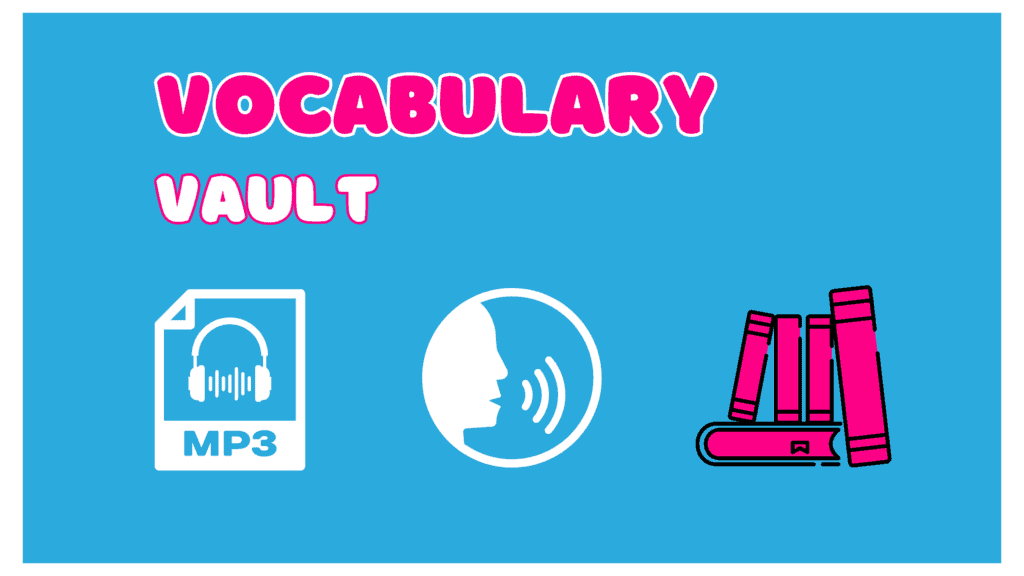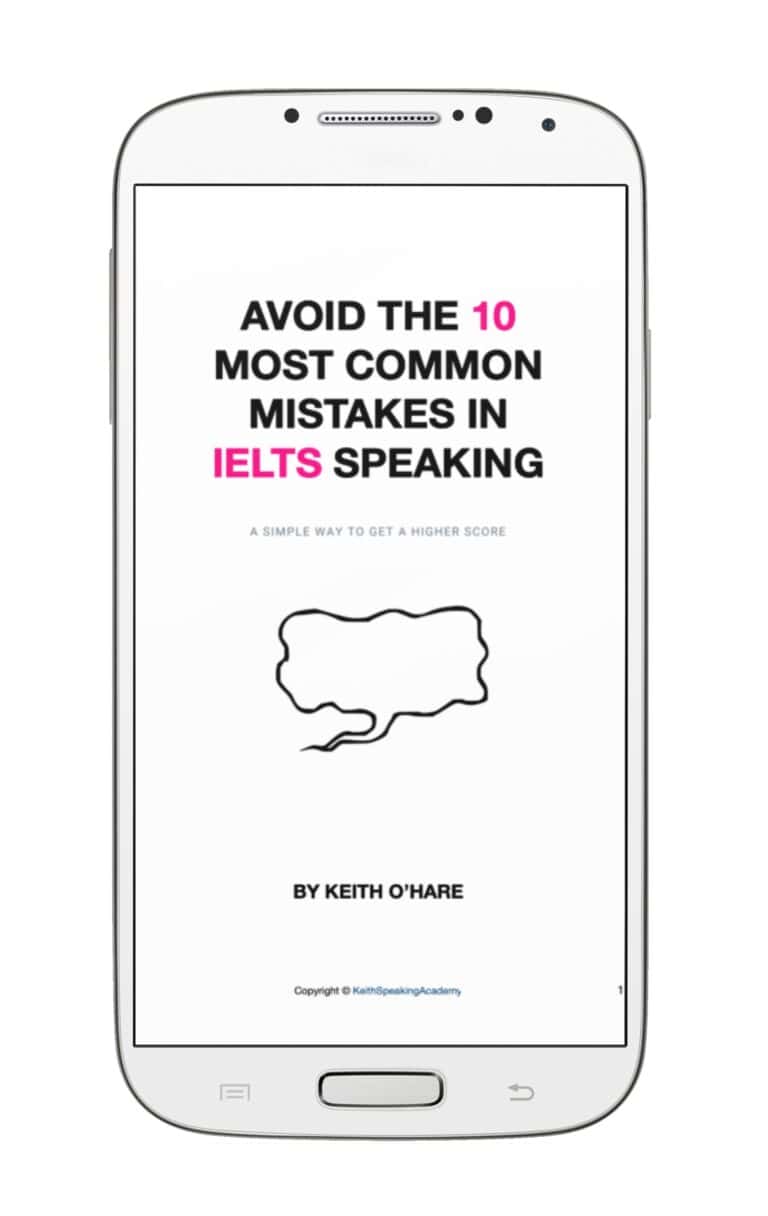IELTS Speaking Lesson about Feelings and Emotions
👇 Take this lesson with you! 👇
Table of Contents
Introduction
In this IELTS Speaking Lesson about expressing feelings, you will learn vocabulary, and language to help you speak confidently on this topic.
There are two main types of feelings or emotions; primary and secondary.
Primary emotions include,
- Love
- Happiness
- Surprise
- Anger
- Sadness
Each of these can lead to secondary emotions, a kind of reaction to the first emotion. For example, love could lead to feelings of,
- Excitement
- Confusion
- Embarrassment
Of course we could also divide feelings into positive and negative ones.
In this lesson we will look at the vocabulary you need to describe a range of different feelings, as well as talking about topical issues such as, mental health and emotional intelligence.
IELTS Speaking vocabulary: Expressing feelings
Common questions to ask people how they are or how they feel are:
- How are you feeling?
- How are you doing?
- How is it going?
Common answers might be:
- I’m doing fine
- I feel great
- I’m fine
- I’m good
- I feel just terrible
Below we can see synonyms for common feelings:
I feel happy today
- content
- pleased
- ecstatic =very happy
- elated =very happy
I am happy about / that _____
- glad
- pleased
- delighted =very happy
- thrilled (to bits) =very happy
I feel angry
- cross
- irate
- vexed
I feel sad
- down (in the dumps)
- low
- blue
- despondent
Practice these, by finishing the following phrases:
I feel vexed when / whenever ……
I feel thrilled when…..
I feel down in the dumps when….
I feel excited when….

IELTS Speaking vocabulary: Word families
When we learn vocabulary, it’s a good idea to be aware of word families, that is, the noun, adjective, verb, adverb, etc… of a word.
Look at the table below and
- Fill in the missing words
- Choose ONE of the words from the table, and make ONE Sentence that is true about you
Answer at the bottom of the page
Verb | Noun | Adjective |
To loathe | Loathing | |
To adore | Adorable | |
To irritate | Irritated / Irritating | |
To confuse | Confusion |
Other words meaning “Confused”
- Baffled
- Perplexed
- Flabbergasted
- Puzzled
- Bewildered
IELTS Speaking discussion: Mental health
How do you keep your mental well-being?
Similar questions:
How do you tackle mental health problems?
How do you handle mental health problems?
How do you cope with mental health problems?
The following phrases can be useful to answer this question:
- Improve your mental health
- Improve your mental well-being
- Build a sense of self-worth
- Boost self-confidence
- Raise you self-esteem
- Build a sense of purpose
- Get a feeling of purpose
- Provide emotional support
- Connect with others
- Share positive experiences
Don’t rely too much on technology
Great for your physical health
Change your mood
Create positive feelings
Small acts of kindness

Here are some possible answers for that question:
I do yoga and practice meditation
I share positivity with mates = friends
I think positive
I adopt a growth mindset
I stay away from toxic people
I indulge in an activity I enjoy, like cooking
I stay away from social media
I do regular exercise
I stay I touch with friends
I take difficulties in my stride = I don’t worry too much
I take problems with a pinch of salt = I don’t worry too much
I keep myself busy
I get engaged in a number of daily activities
Get more advice from this website
IELTS listening task: Feelings
Watch and listen to Stan talking about feelings and how men and women express feelings in different ways.
Try to spot as many words/phrases as possible related to feelings.
Listening Task: Feelings (Tape script)
Click here to read script
My girlfriend Julie, she is very good at expressing her feelings. Sometimes, you can read her like a book.
When she’s happy, she tells you.
How are you love? Ohh, I’m over the moon. I’m ever so pleased I passed my exam.
When she’s down in the dumps, you can tell.
Are you ok, dear? No, I am not, I am depressed.
I don’t want any dinner, I am not in the mood, leave me alone.
That’s Julie.
When she’s angry, you know about it, right?
I am so cross with Colin at work, I did a great job preparing our presentation and he stole my thunder, telling the bosses it was mostly his work! Idiot!
Tell you what, my Julie is an expressive person.
But, when she asks me: how are you doing? Yeah alright
Are you feeling ok? Yeah alright
Some men, like yours truly, are just not very expressive, right?
Some men, I reckon, like yours truly, it’s not that we don’t how to express our feelings, it’s just that we don’t always know how we actually feel!
We don’t spend a lot of time thinking about feelings
and analysing them. We just are!
What was that geezer, that bloke, who said,
“I think, therefore I am”
Well, I reckon, if he were a woman, sorry, If he had been a woman, she would have said,
“I feel, therefore I am”
I reckon men today, it’s more like,
“I am, therefore I am”
Idioms to talk about feelings
To be in the mood to do / for doing = to feel like doing something
To have mood swings = your mood changes a lot (negative)
To be in low spirits = to be sad
To feel down in the dumps = to feel sad
I am feeling under the weather = feeling sick, feeling off colour
To be on an emotional roller coaster = to be experiencing lots of different emotions (negative)
To be on a high = to be happy
I feel out of sorts = I don’t feel myself = don’t feel comfortable or happy
I am tickled pink = to be very happy
IELTS vocabulary: Word families answers
Verb | Noun | Adjective |
To loathe | Loathing | Loathsome |
To adore | Adoration | Adorable |
To irritate | Irritation | Irritated / Irritating |
To confuse | Confusion | Confused / confusing |
Pronunciation Files For Vocabulary From My Best Live Lessons
Use Words EASILY in English Conversations!
More Free IELTS Speaking Lessons
If you liked this lesson, leave a comment below!
There are more lessons you can follow in the links below too.
FAMILY in IELTS Speaking. How to talk about your family, stages of life, as well as idioms about family.
COMEDY in IELTS Speaking. Learn different types of comedy and idiomatic expressions related to comedy and jokes.
KEEPING FIT in IELTS Speaking. Learn different types of activities we do to keep fit and the language you need to talk about them



Thanks a lot, Keith for this lesson on feelings and emotions. I can understand there is a lot of hard work, patience, and dedication in doing this IELTS Speaking live lessons and preparing notes, and giving us valuable informations which helps us to fulfill our dreams. God bless.
Thank and I’m glad to know it is useful!
Thanks it is useful 🙏🏼
I usually have mood swings during my period. One time, I’m adorable and the other time, I can be irritating. I so loathe this feeling because it irritated my family especially my in-laws. Well, I reckon they live in a confusion wondering what my true color is. However, I adore my husband for understanding me every time I’m being an emotional rollercoaster.
Lovely example – well done!
One of the best teachers
Thank you so much!
1.loath
2.adoration
3.irritation
4.confusing
Loath
Adoration
Irritation
Confusing
Thank you sir for your immense hard work.This is valuable task and most excited part is it will connect us when we attend today’s live session.
Thanks and glad you like it!
loathe
adoration
irritation
confused
I felt confused about the score published.
loath
adoration
irritation
confused
Ann feels adoration toward her husband.
To do the same routine is loathsome feeling.
Avoid things that are reccurrng , it would damage your selfand kill the feeling of curiousity for kniwing what is new
We should be satisfactory in every thing we do or else we feel irritated and sad
Loathful
Adoration
Irritation
Confused
In spite of the fact that I have studied English for many years, but still been confused when speak it out.
Oh , ya . It is an jnteresting to topic to learn how to express our feeling in different situations.
English is neglected alittle bitin my country because there are no opportunities for leople to work and use it. I ‘ve been teaching it for twenty years and and commercial students haven’t got the strong curious feelig to develop it . It is the most disappointing feeling that i have had . I know that one hand never clap . Asuccessful teacher needs students who are full of unlimited passion for learning
Great to see your passion as a teacher and student!
Nice example, just note: “I am still confused when I speak it out”
To do the same routine is loathsome feeling.
Avoid things that are reccurrng , it would damage your selfand kill the feeling of curiousity for kniwing what is new
We should be satisfactory in every thing we do or else we feel irritated and sad
How very true!
1. Loath; I don’t like cabbage. I loathe it much
2. Adoration; I adore my huisband who always care for the poor and also his adoration of pets is very adorable
3. Irritation
4. Confused; I’ve learnt English for many years but when I am asked to make a sentence, all everything I know about English dissappeared as if the things blow with the wind. Please teach me how to make a nice sentences or in English style .
I have a feeling of gratitude for Mr Keit as he spends his offering us the best skills to learn English. He is realy fantastic person and I have the feeling of excitement when watching his glorious sessions
Pleased to hear that – thanks!
I think you are making some nice sentences here Lenni. I love number 2.
One thing you can do in writing, is after you have written a sentence, just go back and check if the tenses make sense.
For example, the last one – “when I am asked…, everything I know DISAPPEARS” (it is conditional that is always true Present + present)
Keep practicing!
Loathsome (adj)
Adoration(n)
Irritable (n)
Confusing (adj)
He gave a confusing speech.
Paul has an irritable personality.
His irritable nature affects all his family around.
He normally speaks in a confusing way which proves he does not have confidence
Nice example!
Great examples!
So let’s stay away from Paul!
1. loath
2. adorability
3. irritation
4. confused/confusing
To do the same routine is loathful
Avoid things being loathsome, it would damage your self.
We should be satisfactory in every thing we do orelse we feel irriteated
Check the first one!
Yes . It is loathsome and not loathfull.
Yes, loathsome is the right answer.
Loathsome
Adorability
Irritation
Confusing
Lovely!
1.loath
2.adoration
3.irritation
4.confused/confusing :learning two languages at the sane time was quite confusing for me.
Spot on with the last one, but check the first one!
Loathe
Adoration
Irritation
Confused/confusing
Check the first one!
Loath
Adorement,adoration
Irritation,irritant
Confused
I love this page and you dear honorable Sir.I wanna connection to this website with very happily and aspect that you have stayed me with you.
Loathsome
Adoration
Irritation
Confusing
Loath or loathsome
Adoration
Irritation
Confusing
loath
adoration
irritation
confused/confusing
I have an adorable daughter.
I am sure you do – nice answer!
Loathful
Adoration
Irritation
Confusion
Loathful/loathsome
Adoration
Irritation
Confused/Confusing
Sentence: As I’m a Cancerian, my mood changes like the weather. At one moment I’m adorable and at the other, I can be irritating.
Loathful
Adoration
Irritation
Confusion
I’m kind a confused person and it irritates people close to me .
What are you confused about?
Nice answer – ha ha – typical Cancer!!
loath
adoration
irritation
confused
Sorry, the spelling of irritation was wrong in the first comment. 😝
Loathe
Adoration
Irritation
Confused
Re-check the first one!
loath
adoration
Irtitation
confused
Re-check the first one!